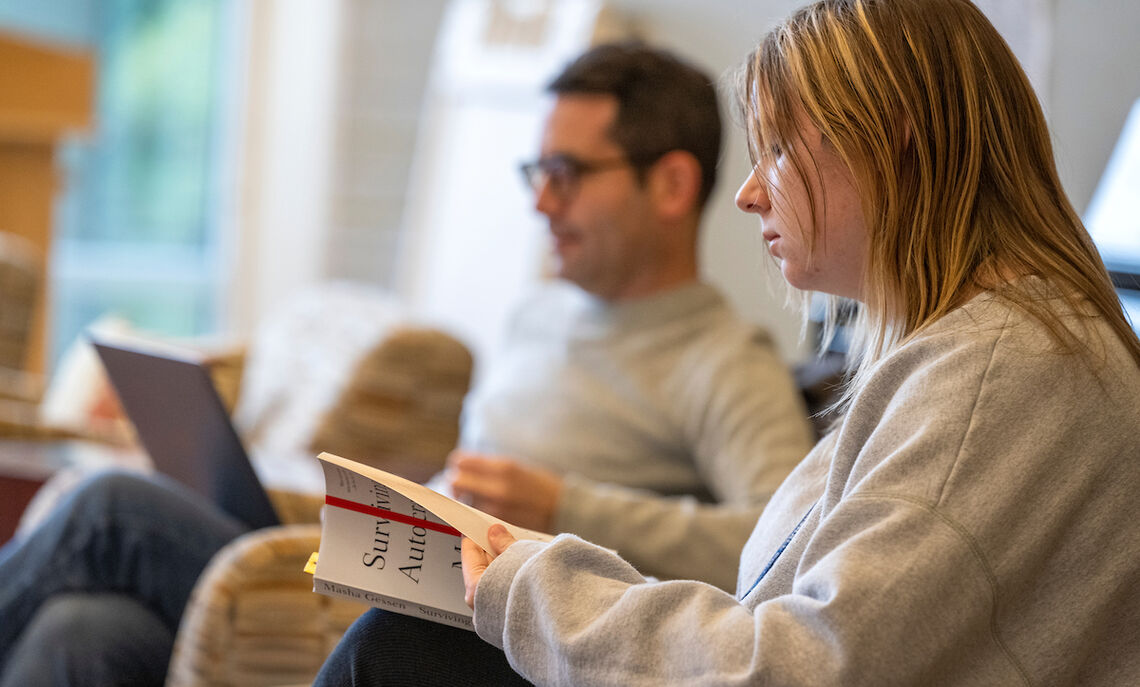F&M Stories
Autocracy and the Challenges to Our Imagination
In the Brooks College House Great Room a few days before Russian-American journalist Masha Gessen addressed a campus audience, a group of students were discussing the writer's works.
"I really like the way Gessen writes," Madison Galczyk from Norristown, Pa., said.
The Franklin & Marshall first-year was paging through "Surviving Autocracy," Gessen's 2020 guide to understanding and surviving the "calamitous corrosion" of American democracy that occurred in the last few years.
As the Oct. 6 speaker for Common Hour, the weekly community discussion conducted during the semester, Gessen talked about the autocracy of Russia's Vladimir Putin and his country's invasion of Ukraine and the war that, at the moment, Ukraine appears to be winning.
The Moscow-born Gessen, who has written numerous books about his former country, recalled someone asking him soon after the war began why many people, including those in Ukraine and Russia, refused to believe Putin would launch an invasion.
"I said, 'because it's unbelievable,' and it continues to be unbelievable even as we witness it," they said. "I think that, aside from seeing it as a fact, we also have to see it as a challenge. It's a challenge to our imaginations."
Gessen, a member of Russia's LGBT community who uses the pronouns them/they, has been an astute chronicler of the rise of authoritarianism in Russia. Among his acclaimed works are the New York Times bestseller, "The Man Without a Face: The Unlikely Rise of Vladimir Putin" and the National Book Award-winning "The Future Is History: How Totalitarianism Reclaimed Russia."
A renowned activist as well as a journalist, Gessen is the 2022 Mueller Fellow. Now in its 41st year at F&M, the fellowship is made possible by the generosity of the Paul A. Mueller, Jr. family.
Although Gessen spoke virtually, they engaged with students, faculty and staff that evening and continued the conversation at a reception in Shadek-Fackenthal Library.
After citing the monstrous atrocities Russians troops are accused of committing against Ukrainian civilians, Gessen said, "The second part of the challenge is thinking about a future — how does this war end, because it will end, and what happens after this war ends?"
Professor of Russian and Russian Studies Jon Stone, who introduced Gessen at Common Hour, spoke about the writer's book, "Surviving Autocracy."
"In trying to make sense of the maelstrom of contemporary American politics in 2020, Masha Gessen read closely a Russian poem from the Soviet 1930s. In Osip Mandelshtam's defiant poem about Stalin, Gessen found that "[e]very line is recognizable six decades later: the sense of not knowing where we live and who we share a country with; the stultifying feeling of not hearing and not being heard, of the isolation that is both the precondition and the product of totalitarianism; and most of all, the daily exercise of demonstrative humiliation and deliberate cruelty."
Related Articles
May 3, 2024
Senior Spotlight: Olha Shapovalenko
A double major in mathematics and studio art, international senior Olha Shapovalenko made the most of her F&M experience. From designing theater costumes to discovering new artistic mediums, the College “enriched my creative vocabulary,” she said.
January 10, 2024
‘Why I Chose F&M’: Students and Young Alumni Look Back
Current students and recent graduates reflect on what led them to choose F&M for their undergraduate experience.
November 27, 2023
Paleontologist in the Making
Senior Conner Minkowitz’s passion for extinct creatures changed when he began studying under a retired Franklin & Marshall College paleontologist.

